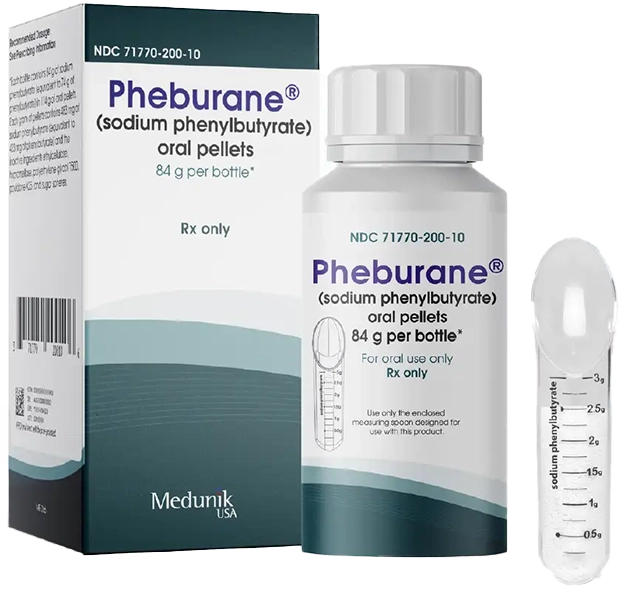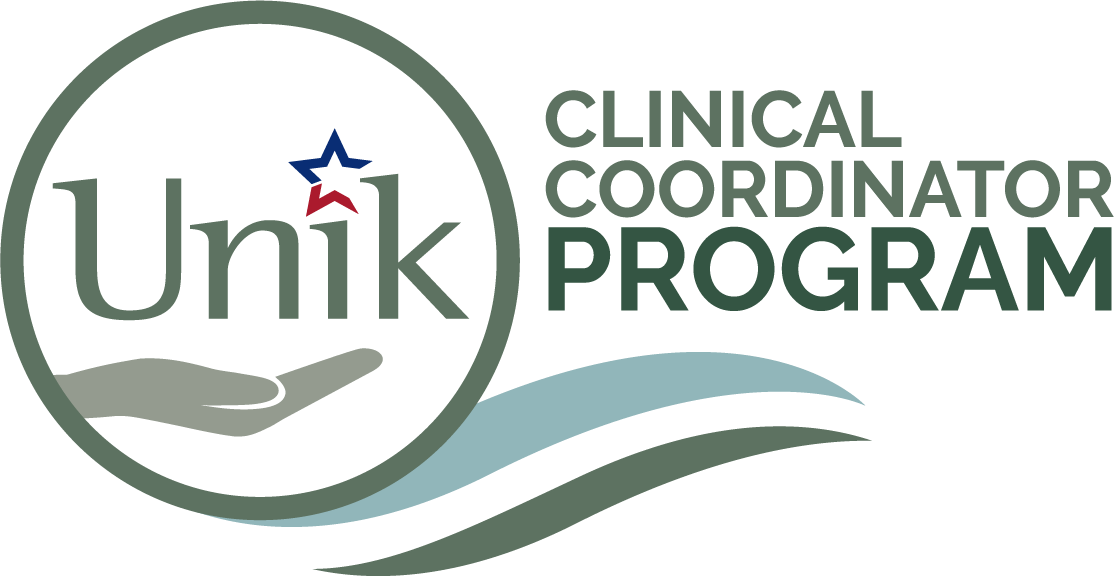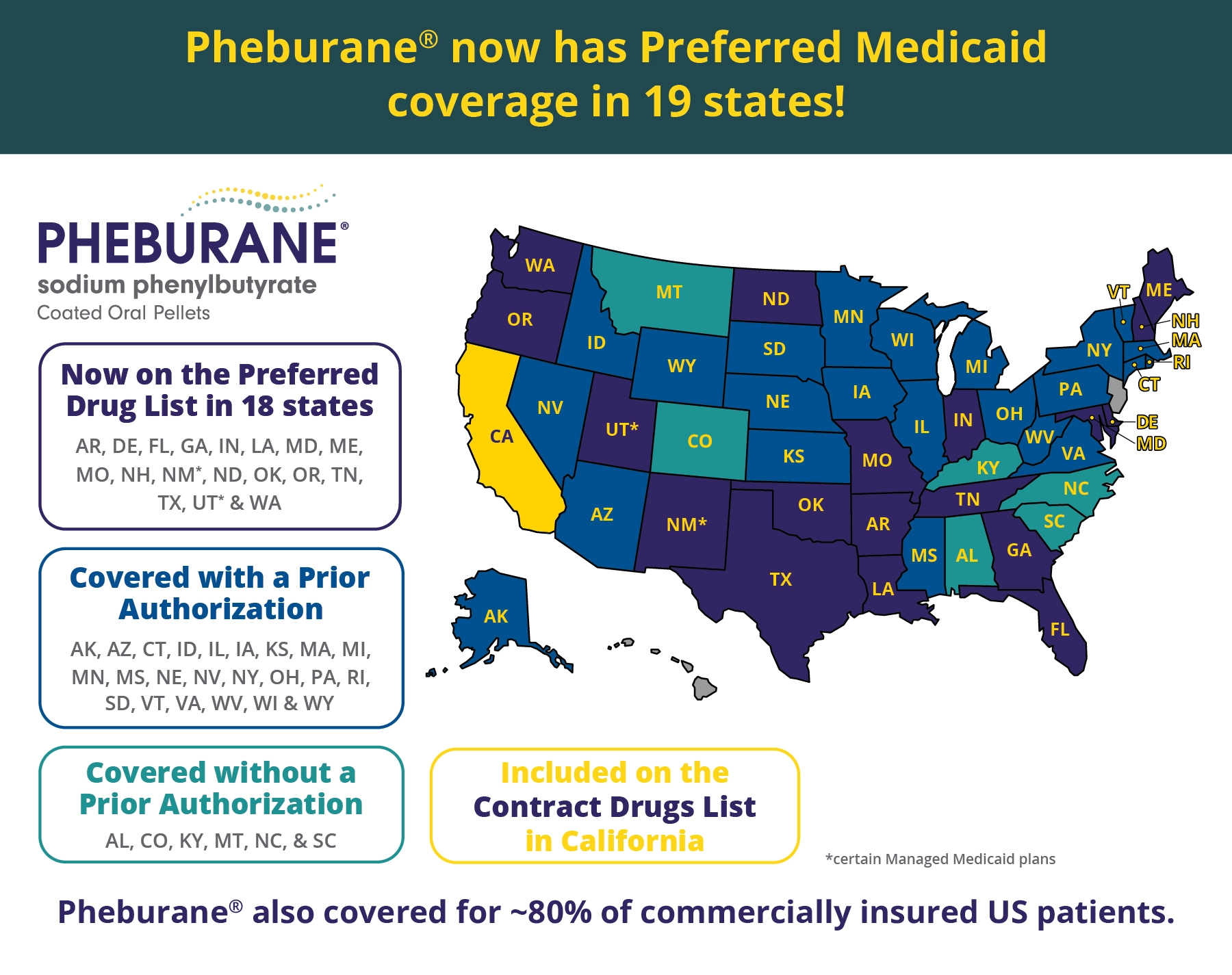PHEBURANE®P=Price

Pheburane® Samples & Demonstration
Units are Available for your Office!
Contact[email protected] for more information.
FOR IMMEDIATE ASSISTANCE
HEALTHCARE PROVIDER HOTLINE:
(833) 491-5168 (TOLL-FREE)

Medunik USA offers Pheburane® through its UNIK Support Program - designed to support each unique patient.
Unik Support (pronounced yoo·neek) has specialized services for Prescribers and Patients.
Medunik USA provides Pheburane® and all its added benefits at a cost that is similar to the other NaPB products and significantly less expensive than the most commonly prescribed chronic UCD treatment.
UNIK offers Prescribers:
- A Physician Ambassador who will be the primary point of contact for physicians that prescribe Pheburane®. The Ambassador will:
- Place a welcome call to the prescriber, upon receipt of a new Pheburane® prescription
- Work with the physician to ensure all patient information is captured
- Guide the prescriber through enrollment in the physician portal
- Assist with prior authorizations and ensure the prescriber is provided with status updates throughout the entire PA process
- Online services through a specialized web portal
- Prior Authorization (PA) and Benefits Management Services
- Pharmacy Services
UNIK Patient Support Program
FOR IMMEDIATE ASSISTANCE ➝
HEALTHCARE PROVIDER HOTLINE: (833) 491-5168 (TOLL-FREE)
By enrolling in the Unik Patient Support Program, your patients will gain access to a variety of specialized support programs, including:

Clinical Coordinator Outreach Program
Copay/Patient Assistance Programs
Every patient deserves access to safe and effective medication. Since cost can be a challenge, special programs have been created to provide support and ensure treatment remains within reach.
With our copay program, eligible patients pay as little as $0* per Pheburane ® prescription.
Additionally, with our Patient Assistance Program, if patients cannot afford a Pheburane® prescription, they may be eligible to receive Pheburane® at no charge.
*See terms and conditions here: https://hcp.pheburane.com/support
Mail Order Pharmacy Services
• Dispensing and coordinating delivery of Pheburane® to the patient’s home
• Applying the Unik Support Copay/Financial Assistance program, if applicable

Quick Start & Bridge Programs
To be eligible for the Quick Start & Bridge programs, a signed Patient Support Enrollment Form must be submitted.
Two Convenient Ways for Patients to Enroll:
UNIK offers Patients:
- A Patient Care Liaison who will work directly with Pheburane® patients and caregivers by serving as their primary point of contact throughout the treatment journey. The Liaison will:
- Coordinate therapy initiation and welcome the patient/caregiver to UNIK and its services and explain next steps
- Provide guidance on the specialty prescription process, reimbursement information, patient access issues, and more
- Provide regular refill outreach to the patient/caregiver
Patients need to fill out, sign, and send in the Patient Support Enrollment form to be eligible for all of the UNIK Support program services.
The UNIK Support Program for Pheburane® is offered through 2 national specialty pharmacy partners: Accredo Health Group, Inc and CVS Specialty Pharmacy.
Available through CVS Specialty Pharmacy
&
Accredo Health Group!

Patient Access
How to get Pheburane® for Hospital In-Patient Use
Contact Curascript SD to order !
Phone: 877-900-9223
Fax: 866-628-8942
Pheburane® NDC: 71770-200-10
Patient Assistance Program – If a patient cannot afford his or her Pheburane ® prescription, Medunik USA may be able to help.
Medunik USA believes that every patient with a Urea Cycle Disorder should have access to safe and effective medication. We understand that the cost of prescription medications can be a challenge for some families. That is why we created our Patient Assistance Program. If you have a patient whose family cannot afford his or her Pheburane® prescription, your patient may be eligible to receive Pheburane® at no charge through our Patient Assistance Program.
Please see Privacy Policy .
To apply, please follow these steps:
- Download and follow the instructions on this Enrollment Form .
- Patient must complete, sign and date Step 1 section on the Application
- HCP must complete, sign, and date the sections marked Step 2 and Step 3
- Patient must submit proof of income, as instructed on the form, under PATIENT ASSISTANCE PROGRAM INSTRUCTIONS on page 2 of the form.
- Fax page 1 of the form to 888-454-8488 .
Important Safety Information
Pheburane® is indicated as adjunctive therapy to standard of care, which includes dietary management, for the chronic management of adult and pediatric patients with urea cycle disorders (UCDs), involving deficiencies of carbamylphosphate synthetase (CPS), ornithine transcarbamylase (OTC) or argininosuccinic acid synthetase (AS).
Limitations of Use
Episodes of acute hyperammonemia may occur in patients while on Pheburane®. Pheburane® is not indicated for the treatment of acute hyperammonemia, which can be a life-threatening medical emergency that requires rapid acting interventions to reduce plasma ammonia levels. Read more
Important Safety Information
Pheburane® is indicated as adjunctive therapy to standard of care, which includes dietary management, for the chronic management of adult and pediatric patients with urea cycle disorders (UCDs).
Limitations of Use
Pheburane® is not indicated for the treatment of acute hyperammonemia. Read more
Important Safety Information
INDICATION
Pheburane® is indicated as adjunctive therapy to standard of care, which includes dietary management, for the chronic management of adult and pediatric patients with urea cycle disorders (UCDs), involving deficiencies of carbamylphosphate synthetase (CPS), ornithine transcarbamylase (OTC) or argininosuccinic acid synthetase (AS).
Limitations of Use
Episodes of acute hyperammonemia may occur in patients while on Pheburane®. Pheburane® is not indicated for the treatment of acute hyperammonemia, which can be a life-threatening medical emergency that requires rapid acting interventions to reduce plasma ammonia levels.
WARNINGS AND PRECAUTIONS
Neurotoxicity of Phenylacetate
Increased exposure to phenylacetate, the major metabolite of Pheburane®, may be associated with neurotoxicity in patients with UCDs. If symptoms of vomiting, nausea, headache, somnolence or confusion are present in the absence of high ammonia levels, consider reducing the dose of Pheburane®.
Hypokalemia
Renal excretion of phenylacetylglutamine may induce urinary loss of potassium. Monitor serum potassium during therapy, and initiate appropriate treatment when necessary.
Conditions Associated with Edema
In order to decide if administration of Pheburane® is appropriate in patients with diseases that involve edema, calculate the total amount of sodium patients will be exposed to, based on their weight or body surface area. If a patient develops new-onset edema or worsening edema while on treatment, discontinue administration of Pheburane® and initiate appropriate therapy.
Diabetes Mellitus, Hereditary Fructose Intolerance, Glucose-Galactose Malabsorption or Sucrase-Isomaltase Insufficiency
Avoid use of Pheburane® in patients with rare hereditary problems of fructose intolerance, glucose-galactose malabsorption or sucrose-isomaltase insufficiency.
ADVERSE REACTIONS
The most common adverse reactions associated with the use of Pheburane® (incidence > 3%) are menstrual dysfunction, decreased appetite, body odor and bad taste or taste aversion.
DRUG INTERACTIONS
- Valproic acid, Haloperidol, or Corticosteroids: May increase plasma ammonia levels. Monitor ammonia levels closely.
- Probenicid: May inhibit renal excretion of metabolites of Pheburane® including phenylacetate and phenylacetylglutamine. Monitor patients for potential neurotoxicity.
OVERDOSAGE
Overdoses of Pheburane® exceeding ten-fold the maximum recommended dosage may produce emesis, CNS depression, metabolic acidosis with or without respiratory alkalosis, hypernatremia, hypokalemia, and hypophosphatemia. Symptoms of overdose overlap with those of acute hyperammonemia. If overdose occurs, discontinue Pheburane®, monitor plasma phenylacetate and ammonia levels closely, and institute appropriate emergency management.
To report suspected adverse reactions, contact Medunik USA at 1-844-884-5520 or [email protected].
Please read the Full Prescribing Information.References:
- Pheburane® (sodium phenylbutyrate) oral pellets [Prescribing Information]. Medunik USA, Inc.
- Kibleur Y, Dobbelaere D, Barth M, Brassier A, Guffon N. Results from a Nationwide Cohort Temporary Utilization Authorization (ATU) survey of patients in france treated with Pheburane® (Sodium Phenylbutyrate) taste-masked granules. Paediatr Drugs. 2014.
- Kibleur Y, Guffon N. Long-Term Follow-Up on a Cohort Temporary Utilization Authorization (ATU) Survey of Patients Treated with Pheburane (Sodium Phenylbutyrate) Taste-Masked Granules. Paediatr Drugs. 2016 Apr;18(2):139-44. doi: 10.1007/s40272-015-0159-8. PMID: 26747635.
- Guffon N, Kibleur Y, Copalu W, Tissen C, Breitkreutz J. Developing a new formulation of sodium phenylbutyrate. Arch Dis Child. 2012 Dec;97(12):1081-5. doi: 10.1136/archdischild-2012-302398. Epub 2012 Aug 31. PMID: 22941860.
- Peña-Quintana L, Llarena M, Reyes-Suárez D, Aldámiz-Echevarria L. Profile of sodium phenylbutyrate granules for the treatment of urea-cycle disorders: patient perspectives. Patient Prefer Adherence. 2017 Sep 6;11:1489-1496. doi: 10.2147/PPA.S136754. PMID: 28919721; PMCID: PMC5593420.
